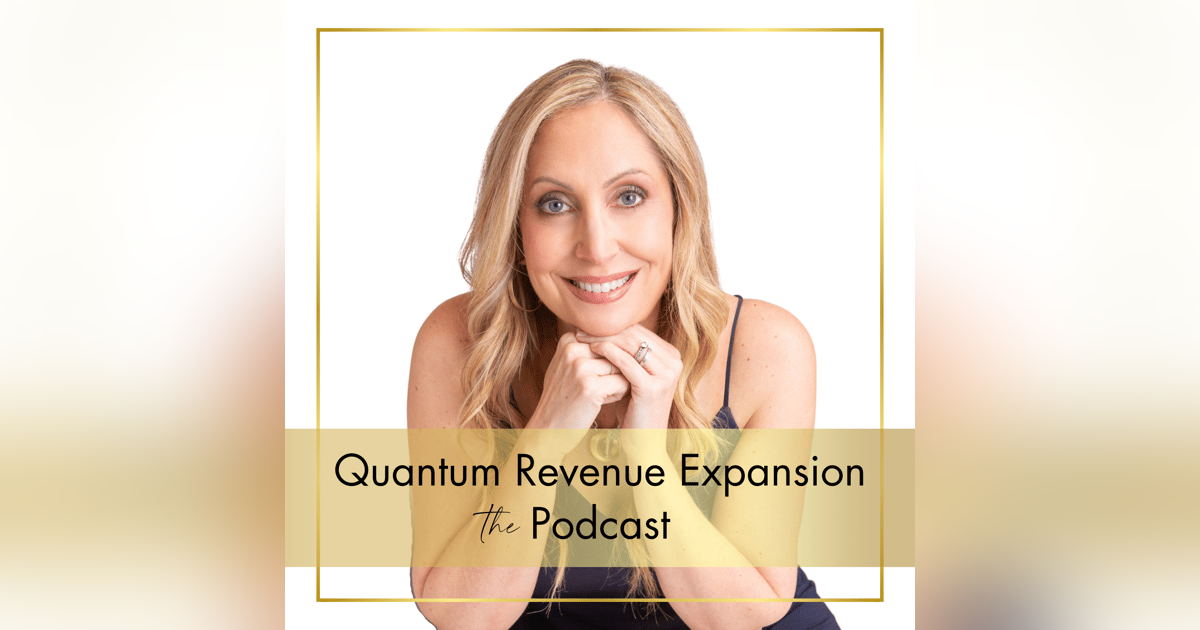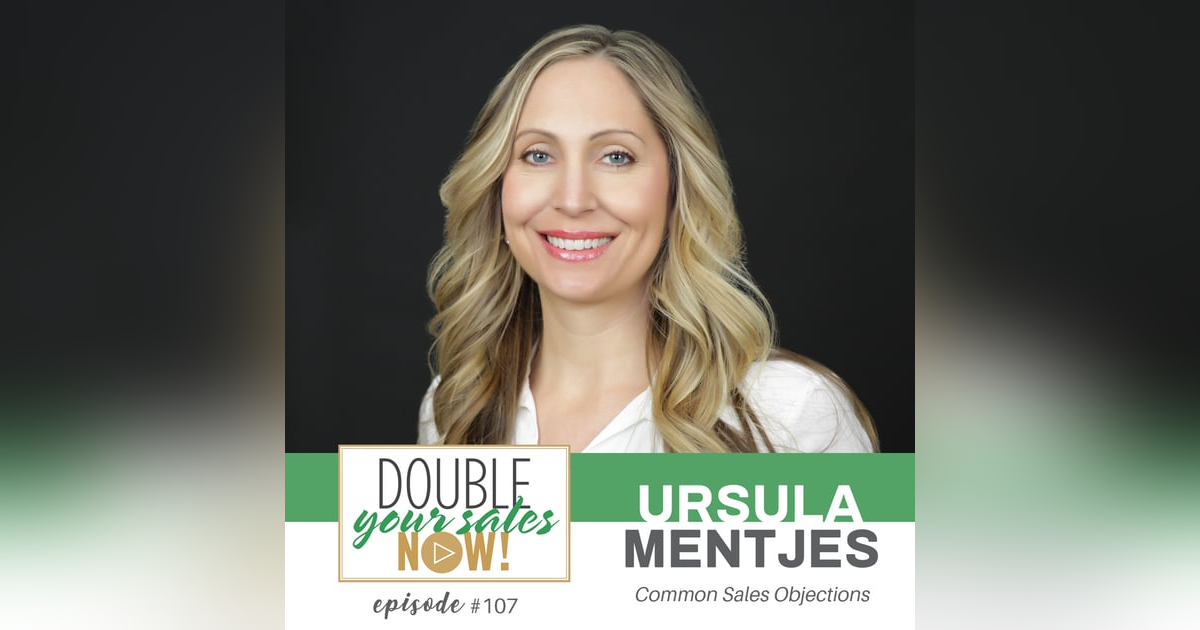
Sign up to get updates from us
By signing up, you agree to receive email from this podcast.

Common Sales Objections with Ursula Mentjes
“An Objection Is A Buying Signal.”— Ursula Mentjes (08:47-08:49)
My goal is to help sales professionals and entrepreneurs understand that selling is a skill. It's a skill that anyone can learn. It's like any other skill that you learn. And once you know it and you're aware of what it takes to sell, then you have that knowledge forever. In this week's episode, Ursula Mentjes talks about common sales objections.
Part One of ‘Common Sales Objections’
I sincerely hope that your sales are coming in. If things aren't moving as fast as you'd like, today's the day to shift that. We're going to talk about common sales objections and how to handle them. How do I handle sales objections? I get this question a lot. I’m never pushy. I don't want them to think that I'm being greedy. Surely, we've all been there. We're going to help you shift that. There are strategies to recognize that these common sales objections are buying signals.
Let’s talk about some of the most common sales objections that you'll run into or are already running into. I'll share actionable steps. I’ll share stories about objections. Back in the day when I was selling technical training consulting, everyone wanted to say no at the forefront. I can teach strategy all day long. But if you have a belief that's limiting you, it's tough to grow your sales. I can help you with the mindset pieces first. Then, I’ll take you through sales strategies to double or triple your sales.
“It’s okay to let that objection sink in and ask a very thoughtful question back.” — Ursula Mentjes (09:37-09:45)
Many of you know my sales background. I was an accidental sales professional. I wanted to go to law school. I had graduated with a liberal arts degree in psychology and communication. I was a bit lost and thought I wanted to go to law school. But I needed money to pay for it and got my first job in outside sales. I was selling technical training and consulting. I was the least technical person on the planet at that time. I learned that selling is a skill. It wasn't about being the most knowledgeable when it came to technology. It was more about developing a relationship with the prospect to figure out if I could help them or not. Could I help with their technical training problem?
To all the introverts out there, selling is for you because selling is more about listening than it is about talking.
I'm an ambivert so I'm a little bit extroverted, a little bit introvert depending on the situation. Most people would say I'm an introvert, but I still can talk a lot. I have a podcast. For our extroverts who listen, I know it can be difficult to pull back. I want to encourage you to remember that selling isn't telling. Selling is asking questions. When it comes to objections, you can ask questions back to make sure you clarify what the objection is. If you've been in sales long enough, you've had objections, right? If you've gotten enough no's and you've gotten enough objections to know that it's part of the process.
I want you to even recognize that as I mentioned before, an objection is a buying signal. Think about that for a second. When someone's objecting, they're saying, “but what about this?” They haven't said no yet. They're still interested in buying your product or service. It's important for you to keep going and to learn more. I find that a lot of times objections will derail a sale. They can shut a sales professional or entrepreneur down. We all know as humans we need clarification. Often, we have questions, we want to know more. So, when someone objects, it's okay.
Part Two of ‘Common Sales Objections’
One of the top objections that people get is money. Let's say you're having a phenomenal conversation, or at least you think so in your head, and your prospect seems interested. They're agreeing with everything. They’re saying, yes, I want your service or I want your product. This sounds phenomenal and we've all been there. You get to the end of that conversation, then hear “I wasn't expecting to pay that much, or, that's a little more than I was thinking, or, that's way outside of our budget.” Don’t assume that’s an objection. What if it's just a statement? What if they're just thinking out loud?
What if they like to speak out loud? I'm a verbal processor. Ask people that know me or spend time around me. We spend enough time around me. You'll hear me talking about things out loud that make no sense at all. People are wondering who I'm talking to, but I have to say things out loud to verbally process. It's one of the reasons I'm a coach. It's one of the reasons I hire coaches because I understand the power of saying things out loud and verbally processing. It's okay if your price point is higher than the others. It's okay if your price point is more than they expected. You still don’t know. Think about that for a second. Even if they make that statement about money, it's not a no.
It only becomes a no if you agree with them or you tell them that you understand. Then it is done. It's over, but you derailed it. They didn't derail it. Stop at that moment and let them keep talking. What I learned early on in the sales process is that selling was so much more about psychology than it was about strategy. It was more about listening and creating space. It was about creating solutions and trying to get to the end result. Sometimes when someone starts giving you an objection, it's also okay to not say anything. They'll keep talking. In sales, silence is a gift, especially when you're getting to the close. They'll fill the silence and they'll tell you exactly what they want. Then your job is to present how they can figure it out.
If it's money, you can offer payment plans. Look at a car dealership. They understand this is a large expense. There's going to be financing. We're programmed to already know that. When we're buying other items, whether they're expensive or something we need a payment plan with, that's okay. That's still our choice to make that decision. Give people space to make their own decisions when it comes to money. If someone wants what you have, they'll find the money for it. They'll figure out how to pay for it because you know what they want. Think about it. Think about the cool stuff that you have, whether it's a service or a product. Think about all this stuff and how the money showed up for that.
“Your prospect needs to think through what you’ve presented to them. Give them that moment.” — Ursula Mentjes (13:17-13:26)
You're selling from a place of authenticity and integrity. You're going to do what's best for that client. Asking your clients what would they like to know to not need to shop around? What kind of answer would take that doubt away? Sales objections are buying signals. There's no reason for you to be afraid of them. There's no reason for you not to keep digging. Remember, selling isn't telling. Selling is asking great questions and giving people the space to think.
How to Get Involved
Ursula Mentjes is the founder of Sales Coach Now, as well as a Sales Expert, Inspirational Speaker, Author and Certified Sales Coach who specializes in NLP to help her clients double and triple their sales. Sales Coach Now delivers a unique approach to sales training and coaching designed for ultimate retention and achievement.
Discover how to transform limiting beliefs, make powerful shifts with intention, and authentically serve (sell) your clients with my free pdf, “6 Secrets to Doubling Your Sales! www.salescoachnow.com/gift
Also, Ursula would love to partner with you at your next event, conference, or sales training session. If you’re interested in coming to Sales Camp, that’s her two-day live course then, you may find out more information here: https://www.salescoachnow.com/sales-camp/.
Here are some great episodes to start with.